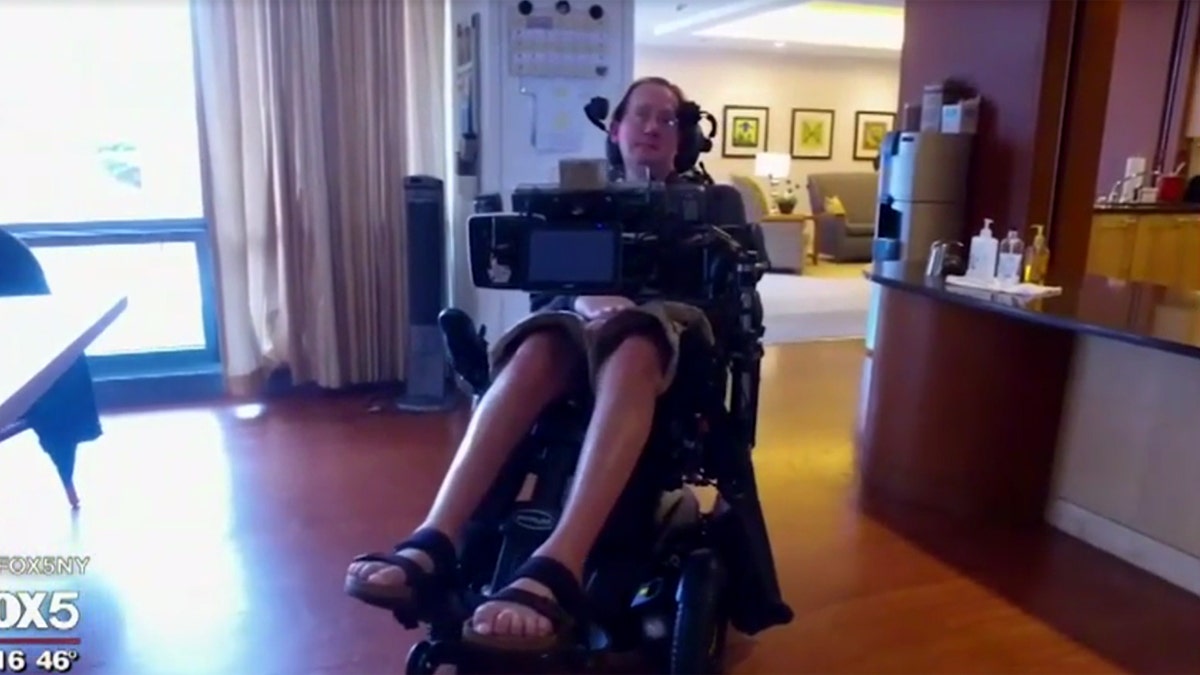
Steve Sailing, 48, has been living with ALS for 10 years. (Fox 5 NY.)
At first look there is nothing remarkable about a bedroom Fox 5 visited with its family photos, collection of DVDs, and sports mementos. It is who lives here that makes it so extraordinary. Steve Sailing, 48, has been living with ALS, amyotrophic lateral sclerosis (also known as Lou Gehrig's disease), for 10 years. The disease cripples the body but not the mind.
"To understand what it is like to have ALS, lay down and have someone tie a 50-pound weight to each foot and each hand," he says, via a computer-generated voice. "You try like hell to move but you just don't make any progress."
Steve can move his head very subtly, but that's it. Most people in his condition wind up in traditional nursing homes, immobile, and completely dependent. But after his diagnosis, Steve, an architect, was determined to avoid that fate. So he designed the place where he and 19 others now live: the ALS Residence at the Leonard Florence Center for Living, outside Boston.
"This is not nursing home with residential trappings," Steve says. "It is my home that happens to provide skilled nursing services."
If you look closely, you'll see a tiny dot on the bridge of Steve's glasses. It acts like a computer mouse. And a camera attached to Steve's wheelchair can read its movements and translate them to his computer screen. That is how he speaks and navigates around the house.
"I can open my door, control the lights, the window shade, the thermostat, the TV and home theater, and any electrical device anywhere in the room," Steve says.
Nothing about the residence looks particularly high tech but in fact there are wires running through the walls and the ceilings, there are sensors all over, tools that enable the residents to have a kind of independence they wouldn't have anywhere else. In fact, all of the technological components are off the shelf. Anyone can buy them. The system is called PEAC. Under Steve's direction, it has been implemented according to the ALS residents' needs.
"Once I'm up and dressed I can open the door, roll out of my house, call for the elevator, come downstairs, chill out, do what I want," says Mike Robbins, of Staten Island. He is one of Steve's housemates. He has had ALS for 20 years, but in the last few years lost use of his arms and legs. He is fortunate to still be able to speak and uses a mouth stylus to operate the PEAC system.
"I'll be honest if I was still home or still in a regular nursing home, I think I'd rather just, you know, go to sleep one night and not wake up," Mike says.
Then there is Patrick O'Brien, 41, a filmmaker who chronicled his decline in an award-winning documentary called "Transfatty Lives." Now he can communicate only through an eyebrow. He is also on a ventilator, which under almost any other circumstance would confine him to bed in a hospital-like nursing home. That is where he was until he got a spot here two years ago. Now, he is not only up and out of bed every day, he has even been to Disney World.
How has being here changed his life?
"This place is all about living," Patrick says. "To be frank, if not for the Leonard Florence Center for Living, it is very unlikely I would be here giving this interview."
"What Steve has accomplished using his eyes only has helped all these other individuals live a very meaningful, dignified life," says Barry Berman, the CEO of the Chelsea Jewish Foundation, the parent nonprofit of the Leonard Florence House and Steve Sailing Residence.
"It's the only place in the world that we know of that has this level or service and care for individuals with ALS," Berman says. "What keeps me awake at night and what saddens me daily is that we could fill this whole building with people who have ALS and similar neurological diseases."
An average of 15 people are newly diagnosed with ALS daily -- more than 5,600 people a year, according to the ALS Association. But this home has only 20 spots, all funded by Medicaid and generous donors. The individual pays nothing. Berman believes this model could and should be replicated throughout the world, but most ALS donations go to researching a cure.
"I hope I live long enough to see a day when this disease is cured but I think there has to be a balance of spending money and resources on research but also caring for individuals that are living this nightmare every single day," Berman says.
Steve looks at a motto on the screen of his computer almost every move he makes: "Until medicine proves otherwise, technology IS the cure."
"There is a big difference between being kept alive and living a life," Steve says. "The ALS Residence is the only place in the world that I know of that provides the opportunity for people with ALS to reclaim their life and to live it to the fullest."








































